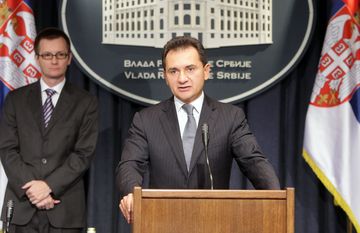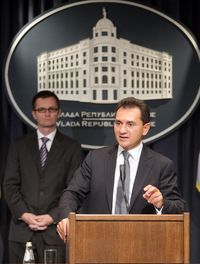- Serbia
Get to know Serbia
- Citizens
Culture and science
Health services
Pension and disability insurance
- Business
Employment
Economy
- Media
- Government
- Contact
Keep in touch
Contact form
Back
Keepin touch
Whether you have a question, comment, suggestion or any problem in the purview of the government, send us your message and we will try to respond as soon as possible. If your problem is not in our purview, we will forward your message to the relevant institution.
Q:
A:
Government adopts bills on restitution, indemnification, public property
Belgrade,
6 September 2011
Deputy Prime Minister for European integration Bozidar Djelic stated that the government today adopted a Bill on restitution and indemnification, with accompanying amendments to the Law on the restitution of property to churches and religious communities, and a Bill on public property.
Djelic told a press conference that the Serbian Parliament will contemplate these documents at the session scheduled for the last week of September, so that they could be enforced in the first half of October.
We will finally be able to reply to the question of what belongs to who in Serbia, Djelic said, adding that this will fulfil the final and crucial part of Serbia’s reform programme for acquiring EU candidate status.
After ten years of expectation, a historic injustice will be corrected and the volume of restitution will surpass the value of the entire privatisation process, as more than €4 billion in money and property will be returned to private ownership.
These laws will strengthen the rule of law, speed up the inflow of foreign investment and raise Serbia’s entrepreneurial capital.
The major part of the restitution will be in kind, while financial compensation will be carried out in bonds collectable over the next 15 years, Djelic explained.
Citizens above 70 will be able to collect the bonds within five years, he added, noting that the maximum compensation per owner will most likely be €500,000.
Public debate on the Draft law on restitution, which lasted from 29 July to 2 September, improved this document in five key domains.
Djelic specified that public debate helped to expand the possibilities of restitution in kind, terms of compensation through bonds and money, speeding up and decreasing the costs of the restitution and indemnification processes, adding that solutions to a number of specific cases were also proposed.
We will finally be able to reply to the question of what belongs to who in Serbia, Djelic said, adding that this will fulfil the final and crucial part of Serbia’s reform programme for acquiring EU candidate status.
After ten years of expectation, a historic injustice will be corrected and the volume of restitution will surpass the value of the entire privatisation process, as more than €4 billion in money and property will be returned to private ownership.
These laws will strengthen the rule of law, speed up the inflow of foreign investment and raise Serbia’s entrepreneurial capital.
The major part of the restitution will be in kind, while financial compensation will be carried out in bonds collectable over the next 15 years, Djelic explained.
Citizens above 70 will be able to collect the bonds within five years, he added, noting that the maximum compensation per owner will most likely be €500,000.
Public debate on the Draft law on restitution, which lasted from 29 July to 2 September, improved this document in five key domains.
Djelic specified that public debate helped to expand the possibilities of restitution in kind, terms of compensation through bonds and money, speeding up and decreasing the costs of the restitution and indemnification processes, adding that solutions to a number of specific cases were also proposed.
Speaking about the Bill on public property, Djelic explained that this document, among other things, envisages that public companies will not be able to automatically take over the property they are currently using, but will be given a two-year deadline to register the property they need for their companies to operate normally.
A number of changes to the Bill on public property were proposed during public debate that will enable its more efficient implementation.
This law is the strongest mechanism in public sector restructuring, Djelic stressed, noting that one of the adopted provisions is that public companies can manage non-constructed building land if it is registered as this company’s capital.
Deadlines for registering public property in the autonomous province and local self-government units were extended from one to ten years and a possibility of joint investment at various levels of government was enabled, with the division of revenue reciprocal to the amount of investment, he observed.
A decree was adopted according to which not only natural running waters, but all waters are to be treated as natural treasure, including minerals.
A number of changes to the Bill on public property were proposed during public debate that will enable its more efficient implementation.
This law is the strongest mechanism in public sector restructuring, Djelic stressed, noting that one of the adopted provisions is that public companies can manage non-constructed building land if it is registered as this company’s capital.
Deadlines for registering public property in the autonomous province and local self-government units were extended from one to ten years and a possibility of joint investment at various levels of government was enabled, with the division of revenue reciprocal to the amount of investment, he observed.
A decree was adopted according to which not only natural running waters, but all waters are to be treated as natural treasure, including minerals.
-
 Belgrade, 22 January 2025
Belgrade, 22 January 2025Egypt one of Serbia’s closest partners on international stage
-
 Belgrade, 9 July 2024
Belgrade, 9 July 2024Support for 104 associations in diaspora that preserve Serbian language, culture
-
 Belgrade, 15 April 2024
Belgrade, 15 April 2024Competition for StarTech grants open until 31 May
-
 Belgrade, 2 October 2023
Belgrade, 2 October 2023Serbia respects Resolution 1244 and will do everything to preserve peace
-
 Belgrade, 13 September 2023
Belgrade, 13 September 2023Day of Serbian Unity to be celebrated outside borders of Serbia, Republika Srpska for the first time
-
 Belgrade, 8 August 2023
Belgrade, 8 August 2023RSD 24.2m in state aid paid out to citizens affected by storm
-
 Belgrade, 17 June 2023
Belgrade, 17 June 2023Belgrade is doing everything to preserve peace in Kosovo and Metohija
-
 Belgrade, 15 June 2023
Belgrade, 15 June 2023Slovenia will continue to support Serbia on its way to EU
-
 Belgrade, 5 May 2023
Belgrade, 5 May 2023Emergency measures, tightening of conditions for possessing weapons
-
 Belgrade, 3 May 2023
Belgrade, 3 May 2023Three days of mourning in Serbia over tragedy at Vladislav Ribnikar primary school



